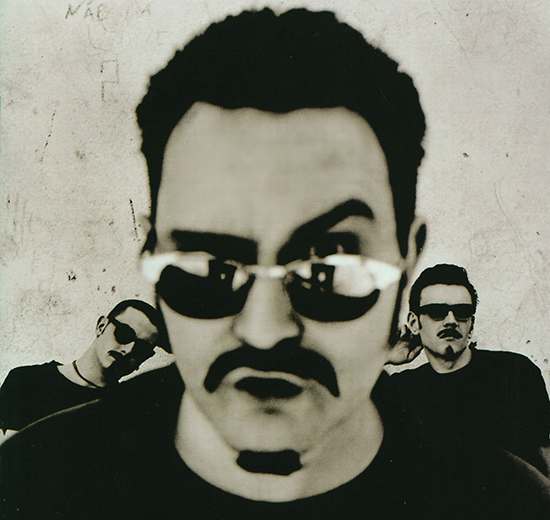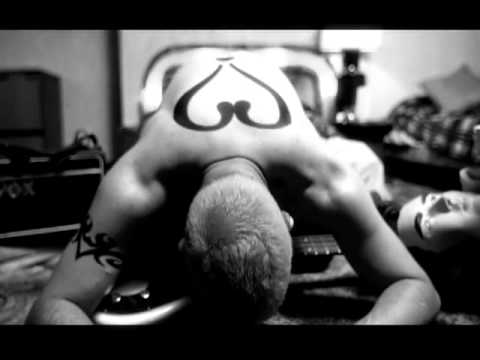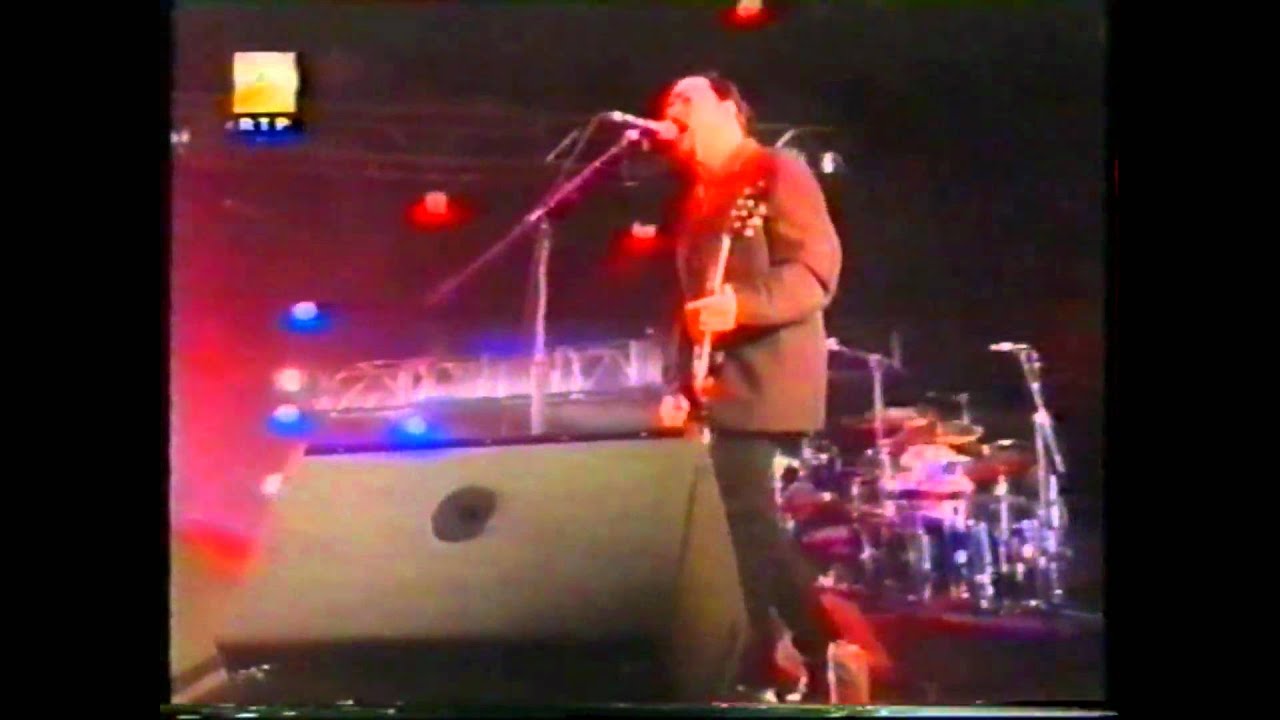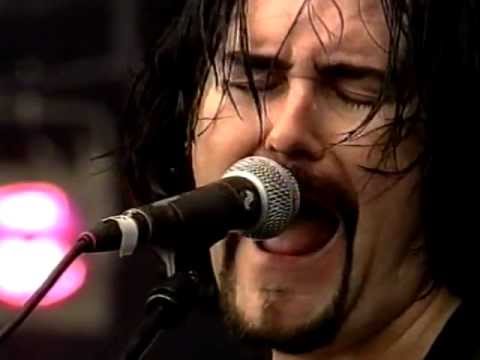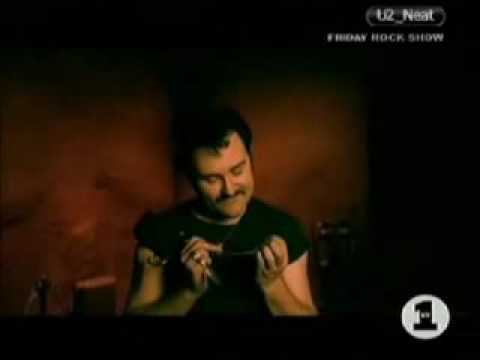Much of the excitement, after all, was bound up in the joy of finally belonging.
John Harris, The Last Party: Britpop, Blair And The Demise Of English Rock
December last year, cold but exciting in Camden when you’ve got Therapy? playing Infernal Love at the Electric Ballroom while Shed Seven are performing at the Roundhouse up the road. Hard to say who’s winning but it’s clear who’s having more fun. The crowdsurfing Santa rolling over the top of a sold-out Electric Ballroom turns out to be the show’s promoter.
It wasn’t always such a celebration, though, and on reflection Andy Cairns says that Infernal Love was the album that nearly broke his band up. It was the album that ended their commercial foothold and later killed their American record deal. It fed an addition to drugs and alcohol that took him years to escape. Yes, says Cairns, it’s only now that he can really discuss Infernal Love in detail.
"Without melodrama it was a catastrophic moment in my life," he says. "Making that album and the year after that album was released. I was quite ashamed of it to be honest. Yet recently there are a lot of people saying it’s their favourite Therapy? record, or even people saying it’s one of their favourite records of the 90s. Now that I look back I can see, maybe, why that is."
He was, he says, brainwashed into thinking that he’d created a disasterpiece, an album so embarrassing that it could only be laughed at. The years before, however, had been glorious, at least when viewed from the outside. Before the Internet democratised opinion-sharing, the print press really mattered. In 1992 Cairns, bassist Michael McKeegan and drummer Fyfe Ewing were heroes in the pages of the indie magazines.
Melody Maker celebrated their first Reading Festival performance – the first of three consecutive appearances – "Mayhem for the straight-faced, shafts of light for the meek." Select magazine had praised Babyteeth and Pleasure Death as being in the tradition of Big Black and Killdozer, and a year later endorsed the major-label debut Nurse as "a humongously big crossover LP". On the same day in January 1994 they appeared on the covers of both NME and Kerrang!.
And it’s hard to overstate the importance of that kind of exposure now. For Therapy? it truly kicked off with Troublegum in February 1994. By the end of the year they’d have two more covers with Kerrang! and the NME, with the covers of Melody Maker and Metal Hammer thrown in for good measure.
They’d gone from touring Ireland in a van to crossing Europe with two busses and contracts for staff and crew to cover tours of America and Canada. On French television they were introduced on by Antoine De Caunes, at the MTV Europe Music Awards by Tom Jones. Top Of The Pops? Three appearances by then, and nominated for the Mercury Prize before Christmas.
On the inside, though, the gales and acceleration of continual travel, the performances, the meetings and the parties had exhausted all three. Cairns and Ewing realised they hadn’t spoken to one another in months, with vague resentments and silence growing between them.
As the public face of the operation Cairns partied and met people wherever possible. Ewing, one of the most distinctive drummers of his generation, craved the privacy and kind of peace that’s crucial for your sanity when you’re contractually obliged to spend hours every day hunched over a drumkit.
While the scale of their exposure wasn’t that of Blur, say, or Nirvana, it was debilitating and came with pressure from everyone who now had a stake in their financial success. And they were, for the first time, simply self-conscious in a way that probably no longer makes sense now that two billion people carry cameras in their pockets.
"Everyone looks at Troublegum with rose-tinted glasses," says Cairns. "But one of the reasons I was in such a bad place when it was going really well – on top of taking loads of drugs and drinking – was that I was simply lost. I’d gone from being someone from County Antrim who played in a band, to travelling the world and being under lots of stress.
"At that point we had a massive operation on the go with management, the label, the crew. People had bought houses on the back of working for us. All of a sudden I’ve got technicians sitting at the back of the bus saying ‘I hope you’re writing more hits, mate, as I’ve got a mortgage to pay.’
"There was also this sense of not knowing who to trust. And moreover the band, who’d basically been a support group for each other since 1990, weren’t talking… not at all. I was a single man. There was no-one I could phone and say, ‘I think I’m in trouble here, and I really need to talk.’
"If I spoke to someone that had to do with the band they’d say, ‘Take a night off the drink and don’t do any gear: you’ve got another six months of work lined up.’ When I spoke to friends at home they’d say, ‘What do you mean? You’re phoning from Milan on a Wednesday night and I’m stuck here. What are you complaining about?’ Of course the drugs didn’t help because along with drugs comes paranoia."
As the sales of Troublegum approached half a million the band dealt with the escalation separately. "Fyfe seemed to withdraw," says Cairns. "Michael was [the opposite of me] drinking two and a half litres of water a day. And while I can look at all this retrospectively now, it was a terrifyingly lonely place for me at the time."
Troublegum had been out for ten months when they finished touring in Germany to go straight into the studio to record a follow-up. A&M records were terrified that Britpop was going to sweep away music with heavy guitars, so they wanted to capitalise on Therapy?’s success.
Even as they toured they had been working on a few new songs, which were demoed at Chapel Studios in Lincoln. Drums were recorded by producer Al Clay at Great Linford Manor in Milton Keynes, before vocals, guitars and bass were recorded at Peter Gabriel’s Real World Studio in Bath.
They arrived in January dissatisfied with the demos and nothing approaching a whole album, spending expensive weeks jamming in the studio. After the first day their A&R man left saying only: "Troublegum has sold 650,000 copies. This one’s got to do a million."
"Infernal Love is about isolation, really," says Cairns. "By then I’d got myself into a place I thought I couldn’t get out of. The whole album deals with it." He was made to feel that he had a choice of two futures: one commercial and one artistic. Refusing to write a variation on Troublegum, he was left alone with introspection, books, memories of art, and a shameful yet irresistible combination of alcohol, cocaine and ecstasy to write rapidly and record in a fit of red-light fever.
Along with books by Flannery O’Connor and Samuel Beckett there was a book by Thomas Moore named Dark Eros – Imagination of Sadism that Cairns had read four or five times. "Dark Eros challenged readers to look squarely at their own disgusting truths," he says. "That was my jump-off point for the lyrics. If there’s uniformity to the album it’s related to that."
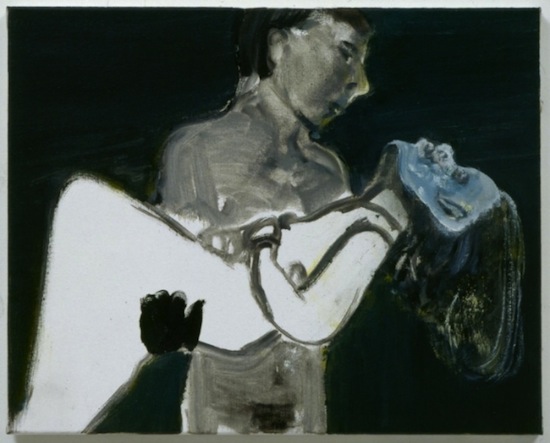
Some of the lines he wrote at night shocked him when he had to sing them the next day. The song ‘Me Vs You’ had been included in concerts the year before, but ‘Bowels Of Love’ was recorded so rapidly that it wouldn’t be played live in the album’s lifetime.
‘A Moment Of Clarity’, which has become a song that fans yearn for, was written in response to paintings by Marlene Dumas, whose 1993 painting ‘Image As Burden’ had also inspired a line here and there on Troublegum. Dumas’ paintings, principally psychological portraits in oil, often depict shame, longing, and erotic despair. The song’s opening line comes from an exhibition note beginning, "I thought of you tonight."
"I do like that song," says Cairns. "It’s got a really pretty melody and people seem to identify with it. Although the whole album was squeezed out of me under pressure, every single word is meant. Every single word. A lot of it is absurd, a lot of it is ridiculous and a lot if it is kind of baffling but all of it is heartfelt. And ‘A Moment Of Clarity’ is one of the songs where maybe that comes across."
Musically, the melodic side of Troublegum had come from The Ramones, Buzzcocks, and Ulster Punk acts like Rudi and the Undertones. The darker side of Infernal Love emerged from listening to The Birthday Party, the Afghan Whigs and Big Star’s Third, a pop record which brings strings into the picture and bottoms out as it documents singer Alex Chiltern’s complex personal apocalypse.
While Therapy? would later be criticised for baroque sentiment and for using strings on ‘Bowels Of Love’, ‘Bad Mother’ and ‘Me Vs You’, their cover of Hüsker Dü’s ‘Diane’ would turn out to be hit which resonated across Europe.
"We were surprised by ‘Diane’, definitely," says Cairns. "Considering it was a jam in Real World that nearly didn’t make it on to the album. Before that, cellist Martin McCarrick had played with us live and on Troublegum and we invited him up to the studio because we loved This Mortal Coil, particularly their covers of Big Star’s ‘Kangaroo’ and ‘Song To The Siren’. When Al Clay happened to play back the jam Martin’s interest was piqued. He took a DAT away with him and returned with a recording of a cello quartet. When A&M returned to the studio they asked ‘Why isn’t this on the album?’
"One reason is that I’d put the vocals down so quickly that I’d misremembered one of the lines. Hüsker Dü are one of my favourite bands and I was scared of offending them. And we didn’t know whether it was a push too far for the band that had brought out ‘Teethgrinder’, ‘Screamager’ and ‘Nowhere’ to have a song using only my voice and a cello quartet. But it seemed to work, and it especially seemed to work around Europe."
After two months in Real World they were running over time, sent up to the smaller mezzanine studio with the knowledge that it was costing thousands of pounds per day to finish overdubs, lead guitars and vocals. Al Clay, who had worked with Frank Black, Pere Ubu and Cud, had a history of singing on pop records and added harmonies to the sunny ‘Loose’. "Al was a really amazing engineer, actually," says Cairns. "He was such a ray of light as well. He turned out to be the guiding hand behind Infernal Love."
He also embraced the idea of having Belfast DJ and soundtrack composer David Holmes link each song with electronic segues and sound effects, which the band had struck upon in a bid to move on from the soundbites and samples of Babyteeth, Pleasure Death and Nurse which were becoming ten-a-penny on heavy rock tracks. The final sounds were signed off over an hour-long international phone call after the band’s itinerary had taken them directly to shows in Australia and France.
The single ‘Stories’ was released in May, reaching No 14 in the UK at the beginning of Robson & Jerome’s seven-week run at No 1 with ‘Unchained Melody’. Oasis had taken their first No 1 a month before with ‘Some Might Say’.
When Infernal Love was released in June, Britpop acts were setting new standards for single sales alone. The Blur Vs Oasis showdown in August, with ‘Country House’ set against ‘Roll With It’, resulted in more than 200,000 sales each at a time when the UK singles market had expanded by 40%. While Therapy? were between dates in Germany and Austria, ‘Loose’ charted at No 25.
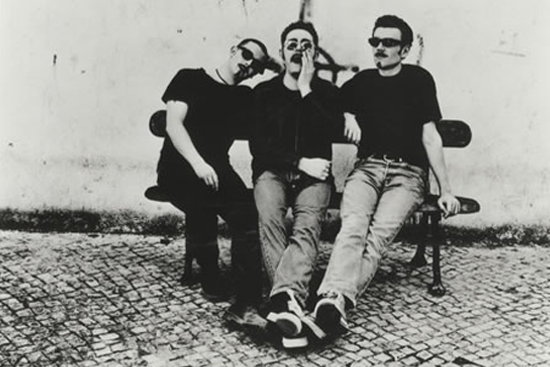
Infernal Love press shot by Anton Corbijn
"When we released Troublegum all the singles charted," says Cairns. "Some of them charted very highly indeed. But by the time it got to Infernal Love the singles weren’t charting as highly. In our naivety we were trying to explain to the record company that it’s an album, it’s a uniform piece of work, knowing that they wanted us to get much higher places in the chart. That John Niven book, Kill Your Friends? That’s not too far off the mark. Any of my peers who have read it say ‘That’s exactly what it was like. That’s what the bands and A&R men were like, and yes, there was that amount of money.’
"But also, whether you like it or not, an awful lot of the Britpop bands had very, very strong singles. The Oasis singles, the Blur singles and the Pulp singles are fantastic records. The fact that Noel Gallagher could write ‘Acquiesce’ as a B-side was fantastic to me. It’s my favourite Oasis track to this day.
"And Suede: Brett Anderson was so obviously a star that Therapy? played thirty seconds of ‘Animal Nitrate’ between songs on MTV. At the time we didn’t see these bands as the enemy. But then you have Gallagher saying he doesn’t understand grunge or people with beards. And when the press started saying that grunge was dead, we were seen to have died with it – never mind the fact that we’d never been a grunge band."
Therapy? had been warned of the inevitability of a backlash by the journalist Carol Clarke, but they were still shocked when it happened overnight.
"When Infernal Love came out you could have distilled a lot of the reviews down to an essence," says Cairns. "’Andy is fat and he’s got a shit beard. Here’s Ocean Colour Scene.’ Some of the barbs thrown at the band, from Select magazine saying I should kill myself to Melody Maker punning ‘Bubblegrunge’… and one Irish magazine saying we should have been shot.
"We’d been buying magazines even in the studio because we’d read them religiously since we were kids in Ballyclare and Larne. Almost every week there was a dig at Therapy?. Initially it was funny, then it was despairing. It would have been Beckettian if it hadn’t been so cruel. The worst was when they saying that we were simply stupid, that we were very thick people. It was just really heartbreaking."
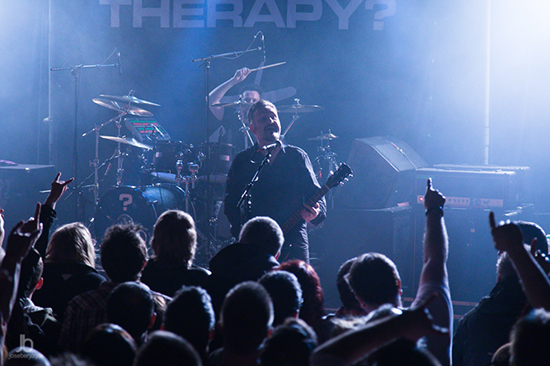
Therapy? live at the Scala, London, 2015 by Jose Berjaga
One thing that might have made a difference, says Cairns, is time. The band continued touring, from Monsters Of Rock at Donington to São Paulo, Chile and Argentina before four months in Europe and a return to the Ulster Hall in Belfast in December 1995, after which Ewing would leave the band.
"If instead of going into the studio to make Infernal Love we’d have been given four or five months off, nobody would have forgotten the band," says Cairns. "Fyfe and I could have made up any differences we had and we could have stepped back from the stupidity of the whole thing. I don’t know what kind of record we’d have made but we’d have been in a better place making it.
"While we knew the album was difficult, and while we knew it was going to polarise opinion, we didn’t expect it to get the massacre it got. I never thought what we were doing was that ridiculous. I just had the tunnel vision of wanting to get the thing finished. But when you look back at it now, separated in time, it’s actually… well, it’s a funny little thing, but I like it."
Therapy? play Infernal Love (and more) across the UK this month with Membranes in support. More details here

